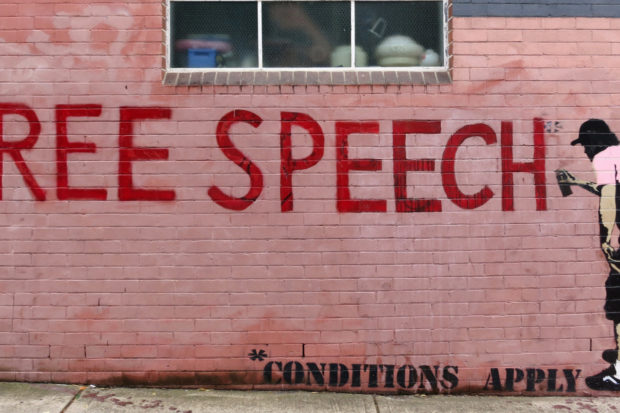

By Kaylia Metcalfe
Back in August, there was a lot of attention surrounding Florida teacher Jerry Buell, who posted on his Facebook page that the legalization of same-sex marriage in New York made him want to throw up.
There was a fair bit of discussion regarding his freedom of speech rights, the responsibility of teachers, etc. People called for him to be fired or punished. Ultimately, the ACLU came to his aid and after a brief suspension, he has been reinstated.
Last week, New Jersey teacher Viki Knox gained national attention with her Facebook tirade against a high school display marking Lesbian Gay Bisexual Transgender History Month. “Why parade your unnatural immoral behaviors before the rest of us. I DO NOT HAVE TO TOLERATE ANYTHING OTHERS WISH TO DO!”
In a later post she defended herself with “Everything God has created, Satan has perverted, EVERYTHING! Sin is sin. Wrong is wrong.” Like Buell, Knox maintains her right to freedom of speech.
Union Chief School Administrator Patrick Martin said the district is investigating the comments. The ACLU is on record as saying that her Facebook comments are protected.
What she said is bigoted, rude and demeaning. But just like I have the right to say what I just said, she has the right to say what she said.
It isn’t always easy, but don’t we have to accept that in our society, we have to allow bigots to say their peace? Don’t we have to accept that if she is punished for her words, that we have violated the very essence of First Amendment rights?
The current law of the land says yes.
Except…she is a teacher. She is highly influential to her students. She is in a position of power and thus shouldn’t she be held to a higher standard?
The personal is so easily public now-a-days. It used to be that teachers were these awesome creatures who lived at school and didn’t have a life outside of the classroom. Seeing your third-grade teacher at the grocery store was downright odd. But now we have Facebook and the “friending” of people we never would have considered as friends. And that is part of the problem.
My ninth-grade English teacher might have been a raving homophobe, but because she didn’t talk about it in the classroom and I didn’t read her diary, I had no way of knowing. Today, her bigoted opinions could be made public, even on a “personal” wall, and thus lead to the perception of bullying and harassment.
The law is slow to catch up to the current plight of Facebook, but harassment laws for years have struggled with this issue. The rules (in California) break down like this. Those in positions of authority, even when off duty, must be aware of their influence and their responsibility to protect others from the perception of harassment.
Now, that statute changes state by state and employer by employer. But should it?
Of course, we need to have the right to speak out against things we find disgusting. We need to challenge the status quo and fight for new rights and changes in tradition. And, of course, we have to allow others to have the right to argue their side, to shout out heralds for the olden days, to call us sinners, etc.
But shouldn’t we have the expectation that at work, and at school, we will be in a safe place where we won’t be shouted down or live in fear? Isn’t that what anti-discrimination laws are all about? Don’t we give up a bit of our freedom to ensure a safe place for ourselves and others?
This is why this particular issue, with these teachers, strikes a chord. They both violated the idea of a safe place by bringing in their outside opinions, and yet it is their rights, their words, that are protected.
I’m not advocating a reversal of freedoms here, just bringing up the notion of reinstating some of those boundaries we had prior to social media. Sometimes we have to pick who gets protected—and right now it is the teachers who are being protected and not the closeted gay teens struggling with depression and isolation in their classrooms.
Steven Goldstein (Garden State Equality): “Teachers are supposed to be role models for our children, not hatemongers.” Goldstein also raised the relevant question of whether a teacher intolerant of homosexuality or alternative lifestyles could enforce anti-bullying laws, which are slowly spreading across the country.
*****
Kaylia Metcalfe is a writer, blogger and activist in Fresno. She is a co-founder of Skeptics Without A Cause and serves on the Gay Central Valley Board of Directors. Contact her at kayliametcalfe@gmail.com.
